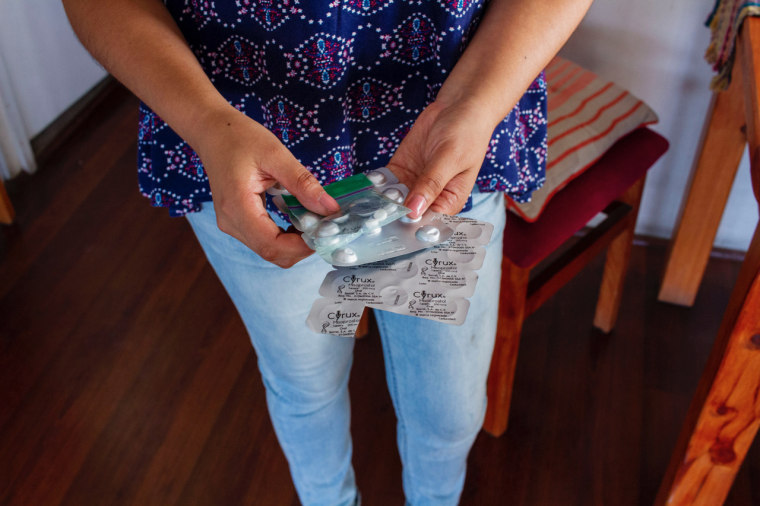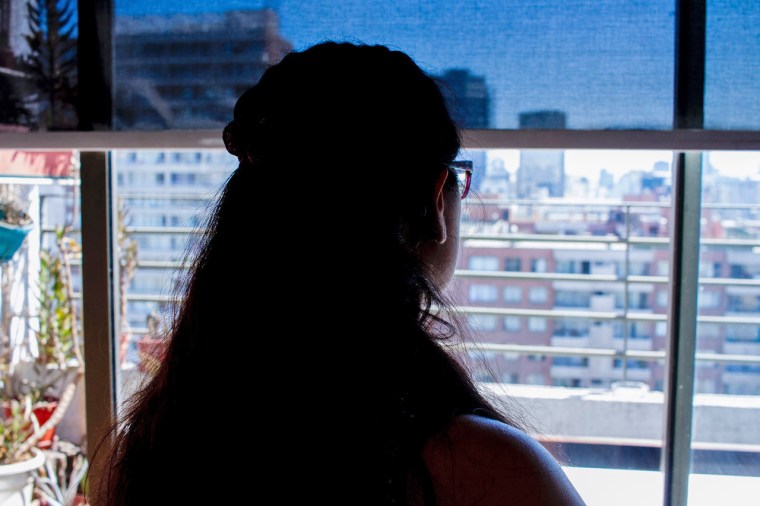SANTIAGO, Chile — The woman anxiously removes the SIM card from the cheap cellphone and cuts the chip into pieces before sweeping the fragments into the trash. When her nerves pass, she allows herself a small sigh of relief.
Despite using a "burner" phone like those associated with drug deals in TV crime series, this woman is using it for a different purpose. A college-educated professional, she's one of several women in a group of abortion "doulas," part of a clandestine network willing to break the law and face prison to help women obtain abortions, as long as it's medically safe to do so.
“We had three girls last week aged between 13 and 16, and all were rape cases," the woman said. “One had been raped by her father, and another by her boyfriend.”
“We are doing this because the law in insufficient,” she added, speaking on the condition of anonymity because she was breaking the law.
Regarded as one of Latin America’s more modern countries, Chile has some of the strictest abortion laws and until several years ago was one of a handful of nations with a total ban on abortion — even in cases of child rape or when the mother or fetus was unlikely to survive.
In 2017, 27 years after the end of Augusto Pinochet's dictatorship, abortion was decriminalized under President Michelle Bachelet under three strict conditions: in cases of rape during the first 12 weeks of pregnancy, or 14 weeks if the victim is under 14 years old; when the mother’s life is endangered; and when the fetus won't survive the pregnancy.
To qualify for a legal abortion as a rape victim, cases of girls under 18 must be reported to police either before or after an abortion procedure, while hospital directors are obliged to inform all cases in women over 18, even if the victim cannot be forced to be part of the legal proceedings.
Many girls and women don't want to go through the process, the abortion doula said. “So the legal route to an abortion was not an option for them.”
Rape victims under the age of 18 also need the signed consent of a legal representative, such as a parent, to apply for a clinical procedure, placing some victims in dangerous and confrontational circumstances.
“This becomes very difficult when in most cases the perpetrator is part of the family or close to it, and usually it is not a single episode of sexual violence,” said psychoanalyst Leslie Nicholls, who worked on crisis intervention with women in forced pregnancies until 2017 when the new laws were passed.
The inadequacies in the way the laws are implemented and the continuing restrictions spurred many women to join a march in Santiago on March 8 for International Women’s Day, and more are expected to make calls for change on Thursday for the International Day of Action for Women's Health.
The doula's group is one of several around the country that assist in an estimated 33,000 to 160,000 abortions annually in Chile. The country's Ministry of Health estimates that 2,500 to 3,000 legal abortions occurred in the same period, 67 percent because of rape. Most women taking the clandestine option find networks to help them either online, or through word of mouth.
The doula said she and her colleagues deal with around 200 cases a year, including girls who have been sexually abused and women in the advanced stages of terminal illnesses who fail to meet the new abortion criteria, but worry about giving birth to a child who would be motherless in a country with notoriously bad foster services and limited social security.
The doula defends her group's work, saying it has helped save lives.
"Abortion had historically been the first cause of maternal deaths in Chile. Now that these drugs are available, even illegally, there are only six maternal deaths a year in the whole country from abortions," she said. "The figures speak for themselves, and they should obviously be available."
Worries about coronavirus limiting access
Under the strict laws, abortion pills are tightly controlled by the government, so groups like the doula’s and others smuggle the pills in from neighboring countries. A course of 12 costs can cost as little as $8 (in U.S. dollars) over-the-counter. They have a street value of $250 in Chile because of the lack of supply, but her group provides them free, accepting only donations.
“The reason we exist is due to the unavailability of these drugs and confusion brought about by false information,” the doula said. “There is no clarity online and conflicting information. Far-right groups post false information to deter people."

While her clandestine network has continued to function through the pandemic, the supply line of pharmaceuticals smuggled in from countries where they are easier to procure is in danger.
“The borders are all closed so the medicines we receive through international solidarity can’t get through,” she said. “We are at a critical situation with around six weeks of supplies remaining, and expect the situation to get worse as international travel remains restricted.”
And as patients with COVID-19 swamp the region’s hospitals, the doula is worried that women seeking assistance for abortions could be sidelined. “The pandemic poses further barriers to women's access to their sexual and reproductive rights," she said.
Helping out, but on high alert
Just like a pregnancy doula, the abortion doula said she offers emotional support and will accompany women through an abortion. She also links them to trusted psychologists if needed.
“Women go to health professionals who don’t understand the law or how to treat them if they are seeking abortions," she said. "The nature of having a clandestine abortion also causes its own problems.”
If a woman needs help, doula or one of the other doulas call them on a burner phone. “They are ‘grandma phones,’” she said. “Very basic with no data connection that might lead someone to our location. We ask the callers to disable all of their data services, and we just trust them”.
The caller’s medical data is established carefully, and the process doesn’t continue without a sonogram proving how far along the pregnancy is. Beyond 12 weeks, abortion can be dangerous or even fatal. “We establish as much as we can before proceeding,” the doula said, “including pre-existing medical conditions, whether it's a normal pregnancy, position of the fetus, everything. The only thing we don’t ask is ‘why?’"
Assisting an illegal abortion carries a maximum sentence of three years and one day, while a woman illegally terminating her pregnancy faces five years, so she remains on high alert with each case. But she said she is not stopping until she and her group feel women are being fairly treated.
Against abortion, for 'ethical and philosophical reasons'
Health professionals and even private hospitals that receive some public funding have the right to refuse to perform abortions, which pro-choice campaigners say leaves many women vulnerable.
Lieta Vivaldi, of the Feminist Association of Lawyers in Santiago, sa aidround 50 percent of doctors in Chile refuse to perform abortions, even legal ones. “It’s very easy to become an objector, filling out a simple form,” she said.
Dr. Sergio Valenzuela is one of these objectors; he does not perform abortions because of “ethical and philosophical reasons.”
“The embryo and fetus are philosophical realities belonging to the biological identity of any human being," he said, "and are only in a very early and vulnerable stage of development."
He adds that "abortion is still not technically legal in Chile; the law only decriminalizes it under the three conditions. Therefore it does not generate a woman's right to an abortion, so there is no correlative duty to perform one.”
The high number of objectors in the system and the lack of follow-up to properly implement the changes allowing some abortions leave many women vulnerable and seeking alternative ways to terminate their pregnancies, say abortion rights advocates.
Abortion has been a deeply divisive topic in Chile, but there may be signs that is changing.

Though few polls have been conducted around the subject, a December 2018 survey by the Center for Public Studies suggested general approval for legal abortion remained low at under 7 percent of women, with around 27 percent, mostly women over 55, favoring a total ban. But 71 percent of Chileans approved of abortion under the three conditions allowed in the 2017 law.
Inequalities in abortion access
"The law has not taken charge of even the cases it must cover; even women that qualify are regularly and systematically denied by the conscientious objection of health professionals," said Nicholls, the psychoanalyst. “There is no state monitoring of these cases, which ultimately leaves everything in the hands of the woman who is already suffering through a complex matter."
Nicholls added that what's most "shocking" is how it reinforces the countries socio-economic inequalities.
"Women who have money can travel to have this procedure, mainly to the U.S. Those who don’t end up on a pilgrimage through different health centers, finding little empathy in the process, abuse and discrimination," she said. "It’s worse in rural area where there are fewer hospitals, and people are generally poorer.”
Presently, civil and feminist movements are focusing on two main aspects concerning abortions in Chile.
“One relates to the implementation of the law,” said Vivaldi, the feminist lawyer. "Since the law allows abortion only in limited cases, most women must continue to seek illegal abortions, as previously. Chile’s law was passed almost two years ago, but various obstacles persist that hinder even legal access to abortion, such as the use of conscientious objection, a lack of trained health care providers and a lack information available to women."
“Secondly, there is a bill to change to free abortion laws, where the focus is not based on why a woman wants an abortion, but purely on the gestational limits. The bill is for free abortion in the first 14 weeks, but there is little hope this bill will be passed.”
Follow NBC Latino on Facebook, Twitter and Instagram.
